New Zealand has being amazing down to a science
New Zealand is well known around the world for its stunning scenery and wide range of amazing activities. However, this quiet little country nestled far from the big movers and shakers in the world has a lot more depth than its popular image lets on.
New Zealand is a modest sort of place. As a rule, Kiwis aren’t keen on self-promotion so the true measure of the nation often rests quietly behind the curtain on the global stage. In reality, New Zealand punches above its weight and is justifiably proud of its many accomplishments and innovations. As an iconic local ad proclaims… “little can be huge”.
More than just a pretty face
New Zealand has a long history of scientific discovery and technological innovation. While it may come as a surprise to some, a wide range of discoveries, inventions, and scientific milestones can be attributed to our humble shores.
 We’ve brought the world scientific breakthroughs – Kiwi scientists were the first to split the atom and helped to prove the structure of DNA; medical advancements – we invented the disposable plastic hypodermic syringe; engineering marvels – the first internal jetboat engine and the first snow plane were designed here; sports and recreation activities – NZ popularised jogging and bungy jumping. We have also introduced many useful everyday items to the world such as instant coffee, the eggbeater, and the electric fence.
Internationally, New Zealand continues to be a favoured destination for scientific endeavour. The country has been home to over 112 science-related conferences and events over the last 5 years, bringing scientists and innovators from around the world together to learn, discuss, and collaborate.
From the technologically advanced to the merely mundane, our little slice of paradise continues to innovate and make a global impact.
Not just for the pros
Happily, you don’t have to have a PhD to explore the sciences in New Zealand. We have a profusion of activities that will educate and delight your inner scientist, whether you are mildly curious or a die-hard enthusiast.
Rare Earth: Geology & Volcanology
New Zealand is situated on its own underwater continent, Zealandia, and is well known for its rugged landscapes, striking geology, and geothermal marvels. Its unusual position, situated along the meeting point of two tectonic plates, has resulted in a unique landscape that offers a wealth of opportunity to explore.
Volcanic and geothermal activity abounds on New Zealand’s North Island. From the steaming flats and hot springs of Rotorua’s geothermal fields to the volcanic activity surrounding the Lake in the Taupo caldera to the smouldering cone of White Island and the majesty of Mount Tongariro, there is plenty to explore and discover.
We’ve brought the world scientific breakthroughs – Kiwi scientists were the first to split the atom and helped to prove the structure of DNA; medical advancements – we invented the disposable plastic hypodermic syringe; engineering marvels – the first internal jetboat engine and the first snow plane were designed here; sports and recreation activities – NZ popularised jogging and bungy jumping. We have also introduced many useful everyday items to the world such as instant coffee, the eggbeater, and the electric fence.
Internationally, New Zealand continues to be a favoured destination for scientific endeavour. The country has been home to over 112 science-related conferences and events over the last 5 years, bringing scientists and innovators from around the world together to learn, discuss, and collaborate.
From the technologically advanced to the merely mundane, our little slice of paradise continues to innovate and make a global impact.
Not just for the pros
Happily, you don’t have to have a PhD to explore the sciences in New Zealand. We have a profusion of activities that will educate and delight your inner scientist, whether you are mildly curious or a die-hard enthusiast.
Rare Earth: Geology & Volcanology
New Zealand is situated on its own underwater continent, Zealandia, and is well known for its rugged landscapes, striking geology, and geothermal marvels. Its unusual position, situated along the meeting point of two tectonic plates, has resulted in a unique landscape that offers a wealth of opportunity to explore.
Volcanic and geothermal activity abounds on New Zealand’s North Island. From the steaming flats and hot springs of Rotorua’s geothermal fields to the volcanic activity surrounding the Lake in the Taupo caldera to the smouldering cone of White Island and the majesty of Mount Tongariro, there is plenty to explore and discover.
 Uncover the secrets of events long past and visit the Te Wairoa archaeological site, where a small village and the once-renowned Pink and White Terraces were buried by an eruption in 1886. Or peer further back into the mists of time as you hunt for fossils in one of the many accessible locations around the country.
Head to the South Island and investigate the strange spherical formations of Split Apple Rock and the Moeraki Boulders. Visit a world centuries in the making and step onto plains of glacial ice as you visit the jagged peaks of the Southern Alps and explore the crystalline beauty of the Franz Joseph and Fox Glaciers. Take in the pristine splendour of Fiordland, home of Milford Sound, and discover first-hand how the massive fields of ice have transformed and shaped the landscape, creating a world of ethereal beauty and mystery.
Uncover the secrets of events long past and visit the Te Wairoa archaeological site, where a small village and the once-renowned Pink and White Terraces were buried by an eruption in 1886. Or peer further back into the mists of time as you hunt for fossils in one of the many accessible locations around the country.
Head to the South Island and investigate the strange spherical formations of Split Apple Rock and the Moeraki Boulders. Visit a world centuries in the making and step onto plains of glacial ice as you visit the jagged peaks of the Southern Alps and explore the crystalline beauty of the Franz Joseph and Fox Glaciers. Take in the pristine splendour of Fiordland, home of Milford Sound, and discover first-hand how the massive fields of ice have transformed and shaped the landscape, creating a world of ethereal beauty and mystery.
 Spectacular Skies: Astronomy & Astronautics
New Zealand boasts some of the darkest skies in the world, resulting in the very best conditions for premium stargazing. Visit Tekapo, Stewart Island, or one of our other Dark Sky Sanctuaries and Reserves and enjoy an unmatched view of the southern skies where you can gaze in awe at the Milky Way sprawling across the heavens.
Spectacular Skies: Astronomy & Astronautics
New Zealand boasts some of the darkest skies in the world, resulting in the very best conditions for premium stargazing. Visit Tekapo, Stewart Island, or one of our other Dark Sky Sanctuaries and Reserves and enjoy an unmatched view of the southern skies where you can gaze in awe at the Milky Way sprawling across the heavens.
 For the amateur astronomer, there are also plenty of astronomical observatories and planetariums where you can investigate the cosmos via telescope or attend educational shows and exhibits that both entertain and enlighten, exploring the mysteries of the universe around us.
Our very own rocket scientist, William Pickering, headed up NASA’s Jet Propulsion Laboratory for over 22 years, and New Zealand continues to harbour a passion for space exploration and rocketry. Rocket Lab, the first private company to reach space in the Southern Hemisphere launches their Electron rockets from our shores. While the facility is not open to the public, if you’re visiting Hawke’s Bay at just the right time you might be lucky enough to catch the spectacle of a launch from the complex on the Mahia Peninsula.
Unique ecosystems: biology, zoology and ecology
New Zealand’s’ remote location and volcanic past has created a unique and diverse natural landscape; thirty per cent of which is set aside as publicly protected land, from conservation areas to reserves to national parks.
Whether you want to take a leisurely stroll or are keen on a multi-day hike, there are a multitude of trails where you can experience the country’s unique ecosystems. Wander through native bush beneath the iconic silver ferns as sunlight filters down through the canopy. Tackle the Tongariro Crossing or admire the peaks rising above the desert as you investigate the tussocks and scrub of the North Island Volcanic Plateau. Learn about the medicinal properties and cultural significance of local plant life, or visit the massive majesty of the Tane Mahuta, the Lord of the Forest, New Zealand’s oldest living kauri tree.
For the amateur astronomer, there are also plenty of astronomical observatories and planetariums where you can investigate the cosmos via telescope or attend educational shows and exhibits that both entertain and enlighten, exploring the mysteries of the universe around us.
Our very own rocket scientist, William Pickering, headed up NASA’s Jet Propulsion Laboratory for over 22 years, and New Zealand continues to harbour a passion for space exploration and rocketry. Rocket Lab, the first private company to reach space in the Southern Hemisphere launches their Electron rockets from our shores. While the facility is not open to the public, if you’re visiting Hawke’s Bay at just the right time you might be lucky enough to catch the spectacle of a launch from the complex on the Mahia Peninsula.
Unique ecosystems: biology, zoology and ecology
New Zealand’s’ remote location and volcanic past has created a unique and diverse natural landscape; thirty per cent of which is set aside as publicly protected land, from conservation areas to reserves to national parks.
Whether you want to take a leisurely stroll or are keen on a multi-day hike, there are a multitude of trails where you can experience the country’s unique ecosystems. Wander through native bush beneath the iconic silver ferns as sunlight filters down through the canopy. Tackle the Tongariro Crossing or admire the peaks rising above the desert as you investigate the tussocks and scrub of the North Island Volcanic Plateau. Learn about the medicinal properties and cultural significance of local plant life, or visit the massive majesty of the Tane Mahuta, the Lord of the Forest, New Zealand’s oldest living kauri tree.
 This diverse biosphere is home to a multitude of wildlife. There are plenty of opportunities to head out into nature and encounter New Zealand wildlife first hand, from our more iconic species such as the elusive kiwi, the curious kea, or the one-of-a-kind tuatara to those that visit our shores and waters. Take a cruise to watch for whales and dolphins or visit the colonies of seals, gannets, and penguins that dot the coast and enjoy their antics in their natural habitat.
This diverse biosphere is home to a multitude of wildlife. There are plenty of opportunities to head out into nature and encounter New Zealand wildlife first hand, from our more iconic species such as the elusive kiwi, the curious kea, or the one-of-a-kind tuatara to those that visit our shores and waters. Take a cruise to watch for whales and dolphins or visit the colonies of seals, gannets, and penguins that dot the coast and enjoy their antics in their natural habitat.
 Alternately, if you prefer not to go so far afield, there are plenty of opportunities to explore, even in a more urban setting. Visit the wildlife sanctuary and encounter the bird and wildlife on Tiritiri Matangi Island off the coast of Auckland, explore the expansive urban eco-sanctuary of Zealandia in Wellington, or experience the mysteries of Antarctica as you investigate the International Antarctic Centre in Christchurch.
From coast to coast, north to south, and land to sea, New Zealand prides itself on its commitment to sustainability and dedication to preserving our unique environment.
Pique your curiosity
So, when Visiting New Zealand, by all means, indulge in the stunning beauty, thrilling adventures, and famous activities that we are known for and do oh so well.
…but bring along your passion, sense of wonder, and thirst for knowledge. Look for the unexpected gems and subtle wonders that may lie off the beaten track. Take the path less travelled, open your mind to the possibilities, and truly explore the depth breadth of this amazing country.
Alternately, if you prefer not to go so far afield, there are plenty of opportunities to explore, even in a more urban setting. Visit the wildlife sanctuary and encounter the bird and wildlife on Tiritiri Matangi Island off the coast of Auckland, explore the expansive urban eco-sanctuary of Zealandia in Wellington, or experience the mysteries of Antarctica as you investigate the International Antarctic Centre in Christchurch.
From coast to coast, north to south, and land to sea, New Zealand prides itself on its commitment to sustainability and dedication to preserving our unique environment.
Pique your curiosity
So, when Visiting New Zealand, by all means, indulge in the stunning beauty, thrilling adventures, and famous activities that we are known for and do oh so well.
…but bring along your passion, sense of wonder, and thirst for knowledge. Look for the unexpected gems and subtle wonders that may lie off the beaten track. Take the path less travelled, open your mind to the possibilities, and truly explore the depth breadth of this amazing country.
 Veronika Vermeulen is Director of Aroha New Zealand Tours Ltd. Aroha New Zealand Tours Ltd. has been offering 100% tailored journeys and private guided luxury experiences in New Zealand since 2000.
If you would like to be a guest blogger on A Luxury Travel Blog in order to raise your profile, please contact us.
Veronika Vermeulen is Director of Aroha New Zealand Tours Ltd. Aroha New Zealand Tours Ltd. has been offering 100% tailored journeys and private guided luxury experiences in New Zealand since 2000.
If you would like to be a guest blogger on A Luxury Travel Blog in order to raise your profile, please contact us.
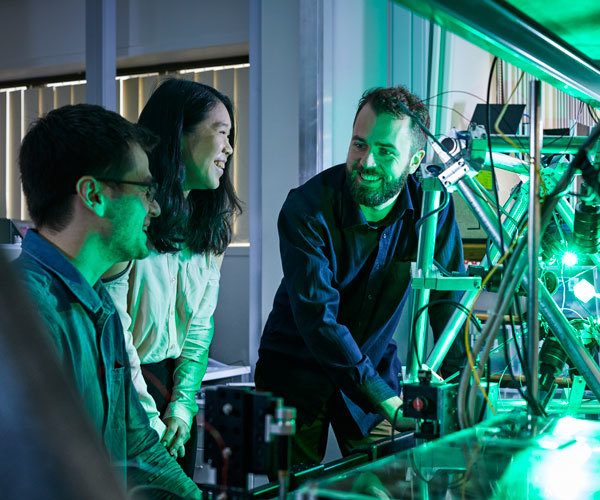 We’ve brought the world scientific breakthroughs – Kiwi scientists were the first to split the atom and helped to prove the structure of DNA; medical advancements – we invented the disposable plastic hypodermic syringe; engineering marvels – the first internal jetboat engine and the first snow plane were designed here; sports and recreation activities – NZ popularised jogging and bungy jumping. We have also introduced many useful everyday items to the world such as instant coffee, the eggbeater, and the electric fence.
Internationally, New Zealand continues to be a favoured destination for scientific endeavour. The country has been home to over 112 science-related conferences and events over the last 5 years, bringing scientists and innovators from around the world together to learn, discuss, and collaborate.
From the technologically advanced to the merely mundane, our little slice of paradise continues to innovate and make a global impact.
Not just for the pros
Happily, you don’t have to have a PhD to explore the sciences in New Zealand. We have a profusion of activities that will educate and delight your inner scientist, whether you are mildly curious or a die-hard enthusiast.
Rare Earth: Geology & Volcanology
New Zealand is situated on its own underwater continent, Zealandia, and is well known for its rugged landscapes, striking geology, and geothermal marvels. Its unusual position, situated along the meeting point of two tectonic plates, has resulted in a unique landscape that offers a wealth of opportunity to explore.
Volcanic and geothermal activity abounds on New Zealand’s North Island. From the steaming flats and hot springs of Rotorua’s geothermal fields to the volcanic activity surrounding the Lake in the Taupo caldera to the smouldering cone of White Island and the majesty of Mount Tongariro, there is plenty to explore and discover.
We’ve brought the world scientific breakthroughs – Kiwi scientists were the first to split the atom and helped to prove the structure of DNA; medical advancements – we invented the disposable plastic hypodermic syringe; engineering marvels – the first internal jetboat engine and the first snow plane were designed here; sports and recreation activities – NZ popularised jogging and bungy jumping. We have also introduced many useful everyday items to the world such as instant coffee, the eggbeater, and the electric fence.
Internationally, New Zealand continues to be a favoured destination for scientific endeavour. The country has been home to over 112 science-related conferences and events over the last 5 years, bringing scientists and innovators from around the world together to learn, discuss, and collaborate.
From the technologically advanced to the merely mundane, our little slice of paradise continues to innovate and make a global impact.
Not just for the pros
Happily, you don’t have to have a PhD to explore the sciences in New Zealand. We have a profusion of activities that will educate and delight your inner scientist, whether you are mildly curious or a die-hard enthusiast.
Rare Earth: Geology & Volcanology
New Zealand is situated on its own underwater continent, Zealandia, and is well known for its rugged landscapes, striking geology, and geothermal marvels. Its unusual position, situated along the meeting point of two tectonic plates, has resulted in a unique landscape that offers a wealth of opportunity to explore.
Volcanic and geothermal activity abounds on New Zealand’s North Island. From the steaming flats and hot springs of Rotorua’s geothermal fields to the volcanic activity surrounding the Lake in the Taupo caldera to the smouldering cone of White Island and the majesty of Mount Tongariro, there is plenty to explore and discover.
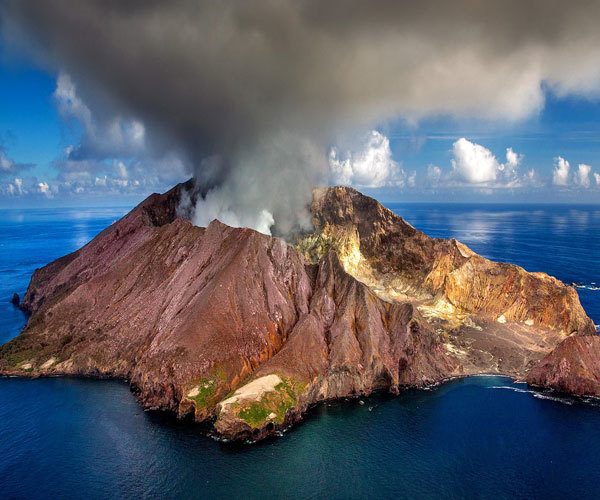 Uncover the secrets of events long past and visit the Te Wairoa archaeological site, where a small village and the once-renowned Pink and White Terraces were buried by an eruption in 1886. Or peer further back into the mists of time as you hunt for fossils in one of the many accessible locations around the country.
Head to the South Island and investigate the strange spherical formations of Split Apple Rock and the Moeraki Boulders. Visit a world centuries in the making and step onto plains of glacial ice as you visit the jagged peaks of the Southern Alps and explore the crystalline beauty of the Franz Joseph and Fox Glaciers. Take in the pristine splendour of Fiordland, home of Milford Sound, and discover first-hand how the massive fields of ice have transformed and shaped the landscape, creating a world of ethereal beauty and mystery.
Uncover the secrets of events long past and visit the Te Wairoa archaeological site, where a small village and the once-renowned Pink and White Terraces were buried by an eruption in 1886. Or peer further back into the mists of time as you hunt for fossils in one of the many accessible locations around the country.
Head to the South Island and investigate the strange spherical formations of Split Apple Rock and the Moeraki Boulders. Visit a world centuries in the making and step onto plains of glacial ice as you visit the jagged peaks of the Southern Alps and explore the crystalline beauty of the Franz Joseph and Fox Glaciers. Take in the pristine splendour of Fiordland, home of Milford Sound, and discover first-hand how the massive fields of ice have transformed and shaped the landscape, creating a world of ethereal beauty and mystery.
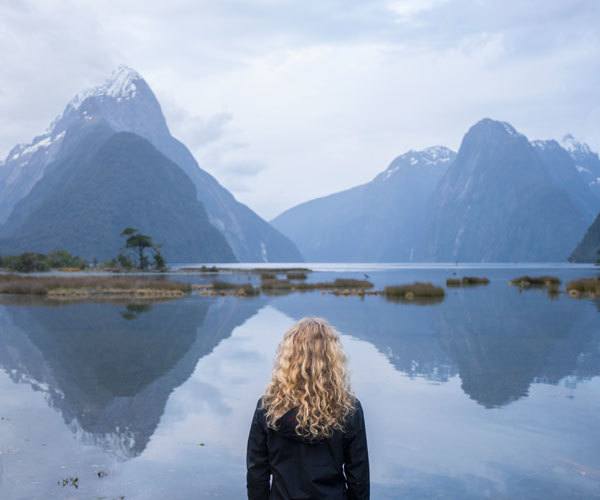 Spectacular Skies: Astronomy & Astronautics
New Zealand boasts some of the darkest skies in the world, resulting in the very best conditions for premium stargazing. Visit Tekapo, Stewart Island, or one of our other Dark Sky Sanctuaries and Reserves and enjoy an unmatched view of the southern skies where you can gaze in awe at the Milky Way sprawling across the heavens.
Spectacular Skies: Astronomy & Astronautics
New Zealand boasts some of the darkest skies in the world, resulting in the very best conditions for premium stargazing. Visit Tekapo, Stewart Island, or one of our other Dark Sky Sanctuaries and Reserves and enjoy an unmatched view of the southern skies where you can gaze in awe at the Milky Way sprawling across the heavens.
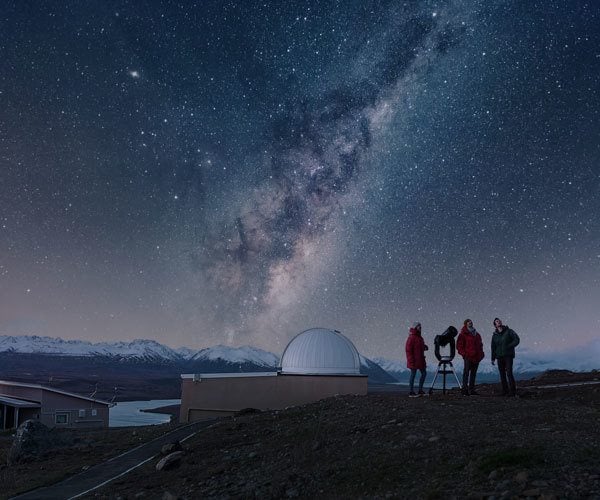 For the amateur astronomer, there are also plenty of astronomical observatories and planetariums where you can investigate the cosmos via telescope or attend educational shows and exhibits that both entertain and enlighten, exploring the mysteries of the universe around us.
Our very own rocket scientist, William Pickering, headed up NASA’s Jet Propulsion Laboratory for over 22 years, and New Zealand continues to harbour a passion for space exploration and rocketry. Rocket Lab, the first private company to reach space in the Southern Hemisphere launches their Electron rockets from our shores. While the facility is not open to the public, if you’re visiting Hawke’s Bay at just the right time you might be lucky enough to catch the spectacle of a launch from the complex on the Mahia Peninsula.
Unique ecosystems: biology, zoology and ecology
New Zealand’s’ remote location and volcanic past has created a unique and diverse natural landscape; thirty per cent of which is set aside as publicly protected land, from conservation areas to reserves to national parks.
Whether you want to take a leisurely stroll or are keen on a multi-day hike, there are a multitude of trails where you can experience the country’s unique ecosystems. Wander through native bush beneath the iconic silver ferns as sunlight filters down through the canopy. Tackle the Tongariro Crossing or admire the peaks rising above the desert as you investigate the tussocks and scrub of the North Island Volcanic Plateau. Learn about the medicinal properties and cultural significance of local plant life, or visit the massive majesty of the Tane Mahuta, the Lord of the Forest, New Zealand’s oldest living kauri tree.
For the amateur astronomer, there are also plenty of astronomical observatories and planetariums where you can investigate the cosmos via telescope or attend educational shows and exhibits that both entertain and enlighten, exploring the mysteries of the universe around us.
Our very own rocket scientist, William Pickering, headed up NASA’s Jet Propulsion Laboratory for over 22 years, and New Zealand continues to harbour a passion for space exploration and rocketry. Rocket Lab, the first private company to reach space in the Southern Hemisphere launches their Electron rockets from our shores. While the facility is not open to the public, if you’re visiting Hawke’s Bay at just the right time you might be lucky enough to catch the spectacle of a launch from the complex on the Mahia Peninsula.
Unique ecosystems: biology, zoology and ecology
New Zealand’s’ remote location and volcanic past has created a unique and diverse natural landscape; thirty per cent of which is set aside as publicly protected land, from conservation areas to reserves to national parks.
Whether you want to take a leisurely stroll or are keen on a multi-day hike, there are a multitude of trails where you can experience the country’s unique ecosystems. Wander through native bush beneath the iconic silver ferns as sunlight filters down through the canopy. Tackle the Tongariro Crossing or admire the peaks rising above the desert as you investigate the tussocks and scrub of the North Island Volcanic Plateau. Learn about the medicinal properties and cultural significance of local plant life, or visit the massive majesty of the Tane Mahuta, the Lord of the Forest, New Zealand’s oldest living kauri tree.
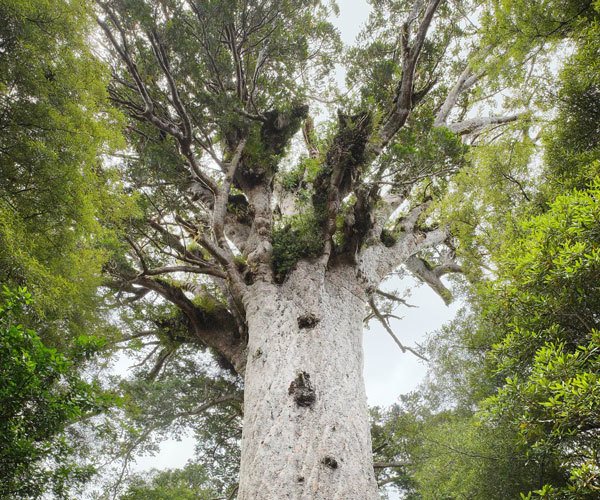 This diverse biosphere is home to a multitude of wildlife. There are plenty of opportunities to head out into nature and encounter New Zealand wildlife first hand, from our more iconic species such as the elusive kiwi, the curious kea, or the one-of-a-kind tuatara to those that visit our shores and waters. Take a cruise to watch for whales and dolphins or visit the colonies of seals, gannets, and penguins that dot the coast and enjoy their antics in their natural habitat.
This diverse biosphere is home to a multitude of wildlife. There are plenty of opportunities to head out into nature and encounter New Zealand wildlife first hand, from our more iconic species such as the elusive kiwi, the curious kea, or the one-of-a-kind tuatara to those that visit our shores and waters. Take a cruise to watch for whales and dolphins or visit the colonies of seals, gannets, and penguins that dot the coast and enjoy their antics in their natural habitat.
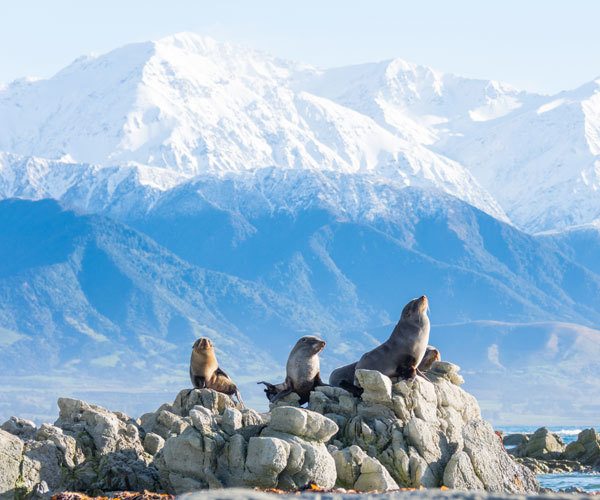 Alternately, if you prefer not to go so far afield, there are plenty of opportunities to explore, even in a more urban setting. Visit the wildlife sanctuary and encounter the bird and wildlife on Tiritiri Matangi Island off the coast of Auckland, explore the expansive urban eco-sanctuary of Zealandia in Wellington, or experience the mysteries of Antarctica as you investigate the International Antarctic Centre in Christchurch.
From coast to coast, north to south, and land to sea, New Zealand prides itself on its commitment to sustainability and dedication to preserving our unique environment.
Pique your curiosity
So, when Visiting New Zealand, by all means, indulge in the stunning beauty, thrilling adventures, and famous activities that we are known for and do oh so well.
…but bring along your passion, sense of wonder, and thirst for knowledge. Look for the unexpected gems and subtle wonders that may lie off the beaten track. Take the path less travelled, open your mind to the possibilities, and truly explore the depth breadth of this amazing country.
Alternately, if you prefer not to go so far afield, there are plenty of opportunities to explore, even in a more urban setting. Visit the wildlife sanctuary and encounter the bird and wildlife on Tiritiri Matangi Island off the coast of Auckland, explore the expansive urban eco-sanctuary of Zealandia in Wellington, or experience the mysteries of Antarctica as you investigate the International Antarctic Centre in Christchurch.
From coast to coast, north to south, and land to sea, New Zealand prides itself on its commitment to sustainability and dedication to preserving our unique environment.
Pique your curiosity
So, when Visiting New Zealand, by all means, indulge in the stunning beauty, thrilling adventures, and famous activities that we are known for and do oh so well.
…but bring along your passion, sense of wonder, and thirst for knowledge. Look for the unexpected gems and subtle wonders that may lie off the beaten track. Take the path less travelled, open your mind to the possibilities, and truly explore the depth breadth of this amazing country.
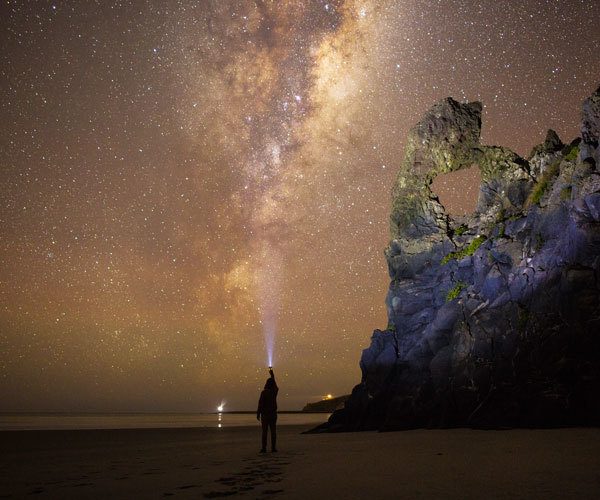 Veronika Vermeulen is Director of Aroha New Zealand Tours Ltd. Aroha New Zealand Tours Ltd. has been offering 100% tailored journeys and private guided luxury experiences in New Zealand since 2000.
If you would like to be a guest blogger on A Luxury Travel Blog in order to raise your profile, please contact us.
Veronika Vermeulen is Director of Aroha New Zealand Tours Ltd. Aroha New Zealand Tours Ltd. has been offering 100% tailored journeys and private guided luxury experiences in New Zealand since 2000.
If you would like to be a guest blogger on A Luxury Travel Blog in order to raise your profile, please contact us.Did you enjoy this article?
Receive similar content direct to your inbox.



For those of us up here in the Northern hemisphere it is a long, long trek to New Zealand and it’s a journey that I am yet to make. It’s fascinating to read about what the two islands have got to offer in the way of science. I’m beginning to believe that New Zealand can serve up a lot of things that I couldn’t get elsewhere.
Everyone of my friends who has visited New Zealand tells me that it’s an epic landscape and I think that more and more, with all the light pollution around us, Dark Skies are becoming a big attraction too. I’d also like to learn more about volcanology.
My apology for the late reply. I wrote this article to make people understand that there is more to us than just nice countryside. You will love the spirit of the people here.
You make a very good point about New Zealand being a modest sort of place. I’ve got a couple of Kiwi mates and they are very quiet and modest too, not given to blowing their own trumpet. Unfortunately, in the modern world it is those who shout loudest who tend to get heard and also those who ask get. I’ve got to agree that New Zealand needs to raise its profile on the world stage. Although the filming of the Lord of the Rings films boosted New Zealand tourism the Tolkien halo ain’t going to last forever. There are a lot of countries around the world shouting loudly and spending big bucks on their tourism budgets.
yes very modest…sometimes a little bit too quiet about it…but one of the reasons people love visiting
It’s brilliant to give a shout out for New Zealand’s achievements, they certainly have a lot to be proud of. I think it’s often the case we know about an invention or a discovery, but not where it came from. That’s certainly the case for me learning that so many of these things were born in NZ. It must be an eye opening experience to travel there and discover things like the volcanos and archaeological sites, along with what’s probably more popular like bush walks, the ecology of the place and its forests. Putting a focus on science definitely gives a new angle to New Zealand, the whole ‘more than meets the eye’ expression comes to mind!
as some pointed out New Zealand people do not want to shout loudly…makes this place even more welcoming. I am proud to be living here…
In my travels around the globe it’s been good to see that many countries have become much better at presenting their science. New Zealand sound particularly promising.
the people of this country have always been very innovative, but as we are at the bottom of the globe, we did not believe it is important enough for the rest of the big world…I think that’s changing now.
As a retired Science teacher I still like to keep some science in my life and I plan to do a big trip to New Zealand soon. Although I’m close to burn out after nearly 4 decades in the science lab of telling kids to draw their apparatus neatly and think carefully about their conckusiins from the experiment I would still be interested to see all this science in New Zealand.
You have a passion for what you do. You might be able to teach some kids over here when visiting!?